

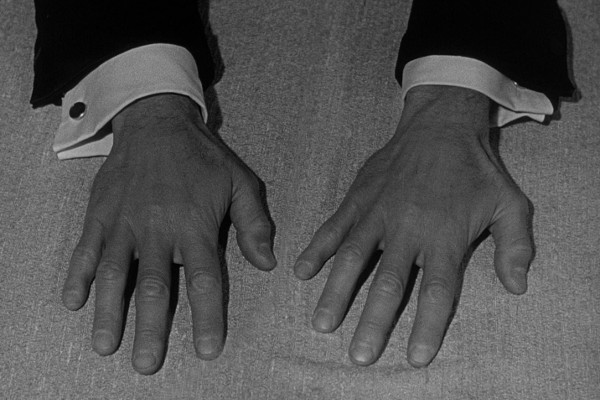
Any real science experiment is laboured and goes through lots of checks... and this episode dutifully follows the same, meticulous pattern. What this doesn't necessarily do is translate to viewer compulsion, and what starts out as engaging soon runs out of steam; the plot, typically of writer Leslie Stevens, isn't strong enough to last the full duration.
It's always easy to think of Joe Stefano as the man behind The Outer Limits, given that he wrote a dozen episodes and was so influential on the format. However, it was the more staid, conventional Stevens that created the concept. His four scripts are all of the "science experiment gone wrong" variety, and lack the layers and sophistication of the series at its best. What's notable here is that, as the second episode produced, the budget is still high before it was begun to be cut back. Perhaps it's coincidence, but these earlier episodes do seem to rely on spectacle over content, perhaps because they can.
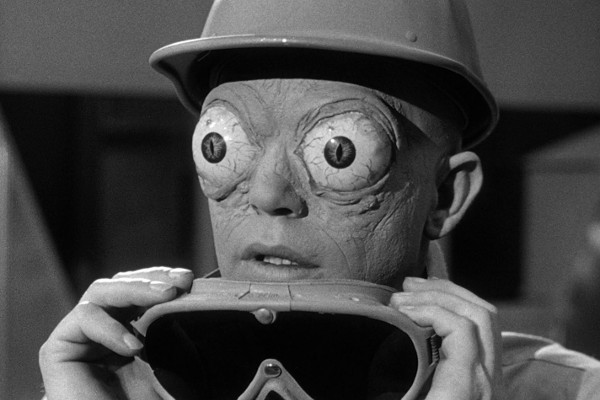
Described by Stefano as "probably the worst show we did", The Mutant isn't actually all that bad... but neither is it all that good. A detective story featuring an Earth psychiatrist investigating a mysterious death in a colony, it would have more lustre if we didn't know who was behind the murders for the entire duration. And the reveal of the murderer would have more lustre if they didn't reveal it ahead of time in the pre-credits teaser. And the murderer himself would have more lustre if he wasn't so damn laughable.
Featuring bland lighting (to be fair, it is set on a planet with permanent sun), characters telling each other their motivations and a painfully crowbarred-in Orwell reference, this one is an episode that you can probably hit "skip" on and not miss a thing. Because the "bear" of the episode is so patently ridiculous, it does provide some laughs (see also: The Mice), but in most levels The Mutant can be filed under "inessential", The Outer Limits once more living down to its negative rep.
A brief cameo from a reworked Zanti (The Zanti Misfits) enlivens things somewhat, but it's too little, too late, and the creatures are made to look so different it's more likely to make you reach for a reference book to confirm that it's supposed to be a Zanti, rather than thrill with certain recognition.
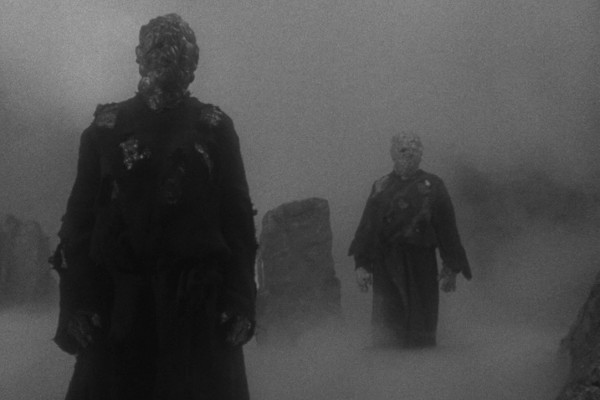
As with The Mutant, I've probably rated this one far too highly. Any "ranking" of Outer Limits episodes is always going to be difficult due to the changeable nature of the format: "apples and oranges" they call it. Still, A Feasibility Study starts off with a lot to offer: the Luminoids are the scariest monsters in the series bar none, and while the talking ones aren't all that great, the shuffling, shawl-bedecked ones are horrifically zombie-like. Add to this David Opatoshu's central character as the put-upon nice guy Ralph, and it shapes up to be something special.
Sadly, Opatoshu gets turned into some ill-advised mutation very early into the screenplay, and what set out to be the two lead characters - Ralph and his wife - suddenly get pushed out of the show to make way for Zoë Wanamaker's dad as the next door neighbour. Now, Wanamaker's Doctor and his wife are both decent actors, but the dialogue they are given to utter is so astonishingly corny, it's beyond a joke. Add to this the plot creaking to a halt and a "love conquers all" ending and what started out as something special has become something far less than its potential. Did I really rank this one so highly?

The Outer Limits didn't really comment on race all that often, and, disregarding a few metaphorical references, only directly addressed it twice in its first season. In 1961 The Twilight Zone was winning a Unity Award for Outstanding Contributions to Better Race Relations… fast forward two years and we have this "red menace" tale of Asians using an advanced disguise kit to infiltrate the government. It's watchable nonsense, though Sidney Blackmer's acting choice of slanting his eyes when under serious reflection is, of course, highly questionable in today's climate.

A laugh riot that should be top ten material on entertainment factor alone. When a scientist gets a chance to trial a teleportation exchange program with an alien race, he does the most logical and sensible thing... decides to beam over a convicted murderer. However, the aliens send their guy over first (we never see their planet, indicating the budget scraping)... and it's absolutely hilarious. Clearly just a man in a cheap, silly-looking suit, the fist fight at the end with the creature and the murderer is essential viewing... but for all the wrong reasons.
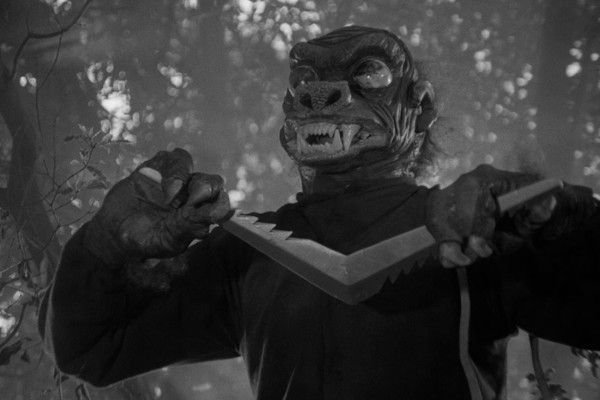
Frederic Brown wrote a short story in June 1944 called Arena, and virtually every SF series going seems to have its own take on it. This actually predates the much more famous "Kirk twats a rubber lizard" episode of Star Trek, though apparently Stefano had never read the story.
The episode underran and so we get lots of reused, or "stretched" footage, such as Mike trying to find a room to hide in about three times over, yet, in context, it works. The story is, as the title would suggest, "fun", and it moves along as a relatively brisk pace. Yet there's that nagging feeling that with at least half of this first season, the programme was content to be pulp.
Mike is an ex boxer, and nothing really is done with his character beyond this brief bit of background. Compare and contrast (for your delight and delectation) to the first boxing story of The Twilight Zone, a virtual all-black cast using the sport as a metaphor for the life of a black man during the 60s: "I got a gut ache from wishing, and all I gotta show for it is a face full of scars. And a head full of memories of all the hurt and misery I've had to live with and sleep with all my miserable life."
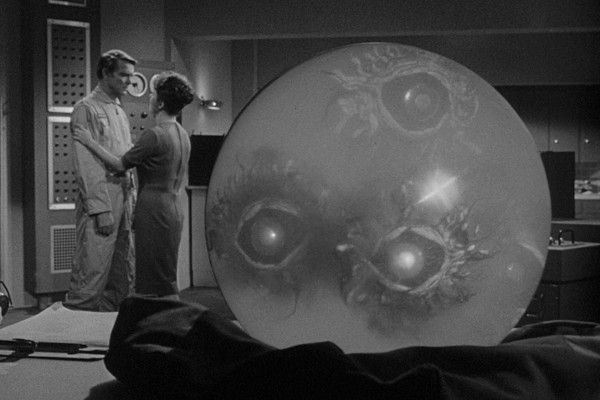
Perhaps nothing in The Outer Limits has dated as badly as the space episodes, and this one - a moon base made up of fairground lights and massive tape decks - certainly won't convince anyone it was made any time after 1940. The two parallel plots - a man haunted by the memory of the Korean War and genuinely eerie aliens seeking asylum - begin to grate the more they begin to dovetail, but this is not one without a certain slow-paced charm.
Yet as the guys behind entertaining blog We Are Controlling Transmission point out, it doesn't quite add up. The Korean War ended in 1953, and, if we assume the actors are playing their own ages, then Major Clint Anderson was being played by a man in his late 30s. Assuming he was 18 at the youngest when he was in Korea and the farthest into the future that this story can be set is 1973.
Were the producers really telling us that Earth would have a base on the moon in, at most, nine years after the air date? It might seem a small point, but it's the way your mind tends to wander during an episode like this. In terms of metaphor then the war references were fairly prescient as Vietnam was still raging, but in terms of plot logic it maybe doesn't quite come together.

Joe Stefano was reputedly undergoing therapy while writing his twelve scripts for the series, and the psychosexual subtexts that got past the censors make the best of them sophisticated and multi-layered. Sadly, Nightmare once more lives down to the worst of The Outer Limits: a bunch of hammy actors saying cheesy lines while an "alien" turns up looking like your Uncle Derrick wearing a cheap outfit from a fancy dress shop.
There is more to this episode than that, including one of the programmes' few direct takes on race relations, but it's all laboured so heavily, and the acting gets more and more outlandish as it goes on. It's certainly not awful, and there's good material in there, but the cheap sets and heavily stylised acting (with one or two exceptions) mean it fails to reach its potential. Unintentionally funniest line may have to go to "I'm sorry, Colonel, but I do not apologise."